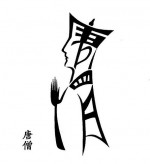 |
Wumen Huikai (1183–1260) was a Zen Master most famous as the compiler of and commentator on the 48-koan collection The Gateless Gate (Japanese: Mumonkan). |
A thunderclap under the clear blue sky
All beings on earth open their eyes;
Everything under heaven bows together;
Mount Sumeru leaps up and dances.
– Wu Men (Aitken, p4). Poem written after enlightenment.
The word Koan comes from the Chinese term kung-an, literally “public notice,” or “public announcement.” There are reported to be some 1,700 Koans in all. The two major collections are the Pi-yen lu, that is, the “Blue Cliff Records,” consisting of 100 Koans selected and commented on by Yüan-wu, in 1125, from an earlier compilation; and the Wumenkuan, also known as the Mumonkan, a collection of 48 Koans compiled in 1228 by the Chinese priest Hui-k’ai, also known as Wu-men.
Basically a Koan is a paradoxical utterance used in Zen as a center of concentration in meditation. The paradoxical nature of Koans is essential to their function: The attempt to break down conceptual thought. Koans are constructed so that they do not succumb to conceptual analysis and thereby require a more direct response from the meditator. Interpreted in this way, the question is an appeal to Chao Chou to draw on his own insight into reality. This restricts the possible responses open to Chao Chou. An affirmative answer to the question would fail and Chao Chou could be accused of reliance on traditional teaching, rather than personal understanding. As such, it would fail to meet the challenge a Koan represent. Nevertheless, Chao Chou cannot answer “no” since this would be to deny scripture. This places Chao Chou in a perplexing situation. Both the ordinary conceptual responses are inappropriate: He cannot answer either yes or no. It is this inability to provide a satisfactory conceptual response that constitutes the paradoxical nature of the present Koan. Koans set up paradox situations like this in an attempt to provoke a non-conceptual response from meditators.
Wu Men Poems
photo: Jpasden Flickr, CC.
